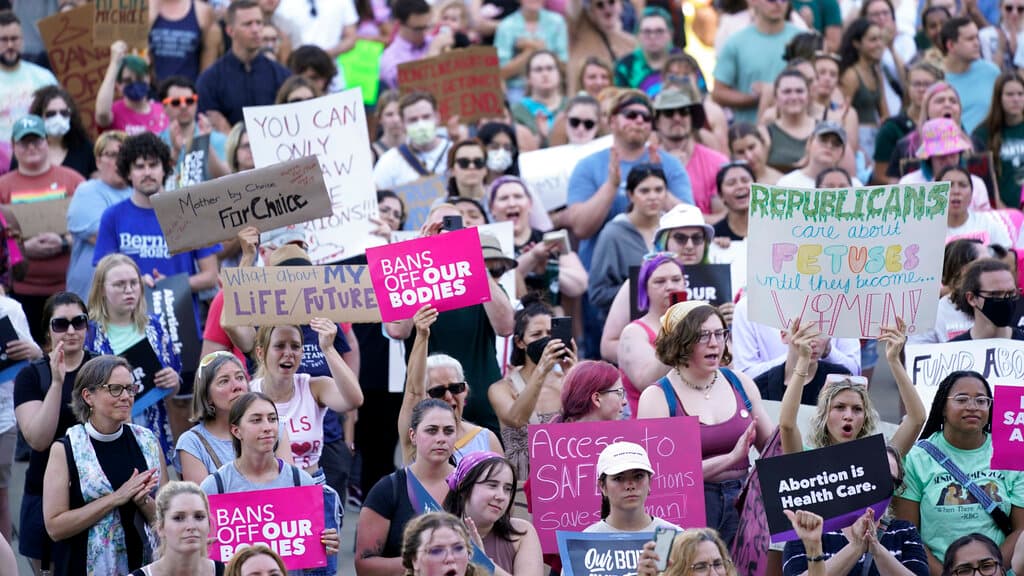Democratic Governors Band Together in Effort To Protect Abortion Rights
The Democratic coalition was created as a counterbalance to a similar group of Republican-led states that have intervened in federal court cases.

In the post-Roe era, abortion legislation — either restricting or guaranteeing the right to an abortion — has stalled out at the federal level. Now, a band of Democratic governors is forming to fight to protect abortion rights.
A coalition of 20 governors announced Tuesday that they would be launching the Reproductive Freedom Alliance with the stated goal of protecting and expanding reproductive freedom in their states.
“In the face of this unprecedented assault by states hostile to abortion rights and their enablers in the courts, we are pledging to work together to strengthen abortion firewalls across America,” the governors said in a joint statement. “This fight isn’t over.”
The nominally nonpartisan coalition consists of 20 Democratic governors, some of whom have made headlines recently for apparent national ambitions, like Gavin Newsom of California, Jay Robert “J.B.” Pritzker of Illinois, and Jared Polis of Colorado.
The group, led by Mr. Newsom, is formalizing a Democratic coalition created as a counterbalance to a similar group of Republican-led states, which have been influential not only in state-level policymaking but in federal court cases.
“This Alliance is a moral obligation to what is right and will stand as a firewall to fight for and protect providers, patients, and all who are affected by these attacks on fundamental rights,” Mr. Newsom said.
The announcement comes as 13 states have implemented outright bans on abortion, five states have implemented restrictions that would not have been allowed under Roe, and eight states have pending bans that are blocked by courts.
Connecticut’s governor, Edward “Ned” Lamont, described the group’s purpose as addressing “a patchwork of radical laws in certain states that are blocking basic healthcare rights.”
With the federal protections of Roe v. Wade gone, cases targeting specific types of reproductive health care have proliferated, even though federal legislation appears out of reach for either party.
One such case that has already attracted briefs from state-level officials and is likely to attract the attention of both the new Reproductive Freedom Alliance and its Republican counterpart is Alliance for Hippocratic Medicine v. FDA.
The case, concerning abortion medication, could have dramatic effects on the availability of mifepristone, an abortion pill commonly used in first-trimester abortions, regardless of state law.
The case has already become a lightning rod for comments from doctors and politicians because of one Texas court’s potential ability to shape national abortion policy.
Senator Wyden has even called on the FDA to ignore a potential ruling by Judge Kacsmaryk of the Northern District of Texas and keep the drug on the market until the Supreme Court rules on the topic.
“In the coming days a lawless Trump-appointed judge is expected to ban access to abortion medication nationwide,” Mr. Wyden said. “I’m calling on the FDA to protect the safety of every woman in America by keeping the drug on the market no matter the ruling.”
The new Reproductive Freedom Alliance also marks the second time in about a year that governors have banded together in an attempt to solve a problem where efforts have stalled out on the federal level.
Last January, delegations from New York, Rhode Island, Connecticut, Vermont, Ohio, Massachusetts, Pennsylvania, New Jersey, and New Hampshire formed the Interstate Task Force on Illegal Guns.
The task force was created to help states address the proliferation of illegal firearms being smuggled into their states through information-sharing and collaboration of law enforcement across state lines.
Alongside increased funding for specialized law enforcement units, the effort saw a relatively successful beginning in New York, with the seizure of some 6,000 illegally trafficked firearms between January and August 2022.

